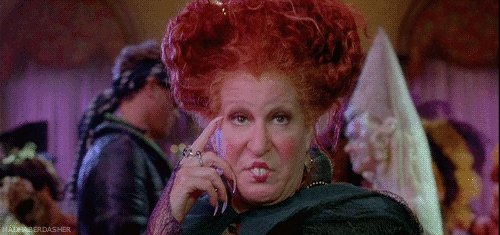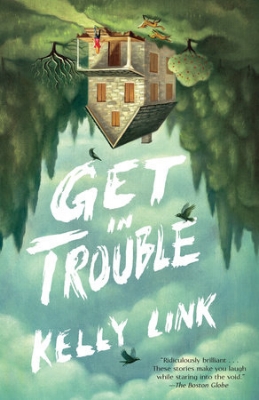Friday the 13th in October means one thing: a marathon of frightening films (or in my case, a corny Halloween movie binge). Whichever genre you prefer, take a peek at some of our favorite spooky flicks (and podcasts!)—from the good, to the bad, to the downright bone-chilling. And while you’re at it, avoid walking under any ladders today.—Stephanie Schaefer
Daniel Ford: Tomorrow's Friday the 13th, which means something horrible will likely befall Sean Tuohy and myself.
Before the inevitable hot-coffee-spills-in-lap scenario, we want to know what your favorite Halloween/scary movie is and why! (Question from the desk of Stephanie Schaefer.)
Sean Tuohy: Doesn't some horrible happen to us every day?
I mean just this morning I experienced the worse thing ever: I woke up.
Here are some of my favorites:
“Halloween”
Besides being a classic and one of the first teen slasher films, “Halloween” is just a creepy movie. It takes its time building up to the final, tension-filled moments. The music alone (which is just a bongo beat switched to a piano) will cause your skin to crawl.
“E.T.”
Look, that scene when the federal agents show up in EVA suits with the blinding white light shining behind them is terrifying. I refuse to watch this scene as an adult.
“Prince Of Darkness”
The middle film of John Carpenter's Apocalypse Trilogy, “Prince Of Darkness” is a "smart man's" horror film. With an original plot line, a great cast, and some horrifying imaginary, this is one of Carpenter's best movies.
“Friday the 13th: A New Beginning”
Stop rolling your eyes! Yes, this is a blood-soaked teenage slasher film with some really over-the-top deaths but…there are some really scary moments that cause you to jump out of your chair.
“28 Days Later”
From the opening scene in the dark underground lab that shows a young eco-terrorist get infected (what you deserve, you hippie!) to the final rain-soaked fight sequence, “28 Days Later” is one of my favorite modern horror films.
“Phantom Of The Mall”
Paulie Shore is in this movie. Enough said.
Stephanie Schaefer:
“Halloweentown” Series
I’m not a fan of horror movies, but I can get down with a good Disney Channel Halloween flick. Plus, the late Debbie Reynolds made the movie with her portrayal of kooky Grandma Aggie.
**Looking up last-minute flights to Oregon.**
“Hocus Pocus”
How can you not love this cult classic? From “I Put a Spell on You” sing-alongs to talking cats and an all-star cast of witches, its 1990s nostalgia at its finest.
Rob Bates: So, this isn't a movie, but I just started listening to, and am very much enjoying, the Mysterious Old Radio Listening Society Podcast, where three dudes play an old radio show and then afterwards analyze and geek out about it. It's a lot of fun.
I would recommend these episodes, featuring episodes from the truly creative and wildly innovative series “Quiet Please:”
“The Thing on the Fourble Board”
This is one of the most famous old radio episodes out there, and I've kind of grown obsessed with it. (Patton Oswalt is a fan.) The plot is,let me just warn you, completely ridiculous, but you kind of "buy" it, thanks to the great lead performance by "Porky" as well as the "guest." Also, you learn a ridiculous amount about oil rigging.
“Whence Came You”
I found this one even freakier than Fourble Board, though it does contain one marginally offensive piece of dialogue, which may be why it isn't well known. But it's awesome.
If you want to hear those shows without the before and after commentary, they are both readily available for download on archive.org.
Remember, the show is called “Quiet Please.” Listen in the dark with headphones!
Mike Nelson:
“Sleepaway Camp”
A basic, campy (like, campy-campy, but also literally about camp), mysterious slasher film that is as stupid as possible until the very end when it becomes genuinely stupider than is conceivably possible in the most fantastic way. I refuse to share a clip. Just go watch it and do not look at spoilers, you jerk.
Sean: I am going to second “Sleepaway Camp.” The ending scene and Judy's death scene make the movie. Also, James Earl Jones's father is in the film.
Daniel: “The Omen” is up with all movies that led to sleep loss for me as a teenager. I remembering watching it with my father, who laughed whenever I'd swear at the television or blankly stare at what was going on. Great flick.
Plus, Gregory Peck. I mean, the guy's a legend.
Caitlin Malcuit:
“The Thing”
John Carpenter’s “The Thing” is a perfect horror movie. It’s gross, it’s scary, and has that amazing Drew Struzan poster. A masterful exercise in body horror and paranoia, “The Thing” is best viewed with the lights out so that deep Antarctic chill can creep into your bones. With fantastic and dark performances by Keith David and Wilford Brimley, it’s also a worthwhile viewing because of Kurt Russell’s beautiful mane.
“Suspiria"
Suspiria is visually stunning, arguably the most beautiful horror film ever made. A standout in Italian giallo master Dario Argento’s oeuvre, this entry in his “The Three Mothers” trilogy is one of the last films ever to be printed in Technicolor. The death scenes alone are enough to put 1980s slashers to shame.
“The Witch”
Robert Eggers’ debut couldn’t be a bigger home run for a director. “The Witch,” moody and slow burning, is one of the most pitch-perfect thrillers in recent memory to hit the genre. Though the forests of Ontario stand in for New England’s onscreen, you won’t be able to walk through your neighborhood woods without a side-eye to the rustling leaves or the next rabbit you see.
Rob Masiello: I'm gonna let you all finish, but "Deep Blue Sea" is the greatest horror movie of all time.
Joking aside, I'd like to submit something arty and weird, but instead am going to recommend “The Conjuring.” It's the first time a movie caused me to audibly shriek, and the whole film is elegantly executed. Even the climax, which is often when horror movies lapse into absurdity (not the good kind), is harrowing. Not to mention Vera Farmiga is always a delight to watch. Sadly, after viewing “The Conjuring,” I read an article criticizing it for socially regressive themes. It got me thinking, and I can't say I disagree. But if you're only after a good spook, it's a must-see.
I'll also second Caitlin's recommendation of “The Witch.” It's a slow-burner that spirals into this urgently fucked up fever dream that will haunt you.
Sean: “The Conjuring” was a solid ghost movie. “The Conjuring 2” starts off great and then falls apart at the end.
Rob Masiello: I agree! The second one was a big disappointment. Never as spooky as the original, and some tacky CGI thrown in to boot. And way too much yelling.
Sean: Yes! Halfway through they got lazy and said, "Screw it! We'll do it on a computer.”
Rob Bates: Can I also recommend the original “Wicker Man?” Saw it a few years ago and it has some weird off-key moments (which kind of work for it) and definitely packs a huge punch. Forget the stupid Nicolas Cage remake; I have never seen it but, based on the excerpts I've seen, I don't want to. And remakes usually suck anyway. But this was great.
If you ever watch the show “Coupling,” one of the characters is obsessed with Britt Ekland in this movie, and if you watch it, you will know why.
Also, “Abbott and Costello Meet Frankenstein” is the supreme horror-comedy. Funny, and even goofy-scary. Can't wait to show it to my kid.
Emili Vesilind: “The Ring!” Couldn't sleep for weeks after seeing it.
“The Nightmare Before Christmas”
Alison Doherty (Writer's Bone newcomer!): This movie is confused. It doesn’t know if it wants to be a Halloween or Christmas movie. Written by Tim Burton, the movie chronicles the adventures of Jack the Skeleton, King of Halloween Town. Jack is overjoyed when he discovers Christmas Town but things go awry when he tries to bring Christmas to Halloween Town.

























































